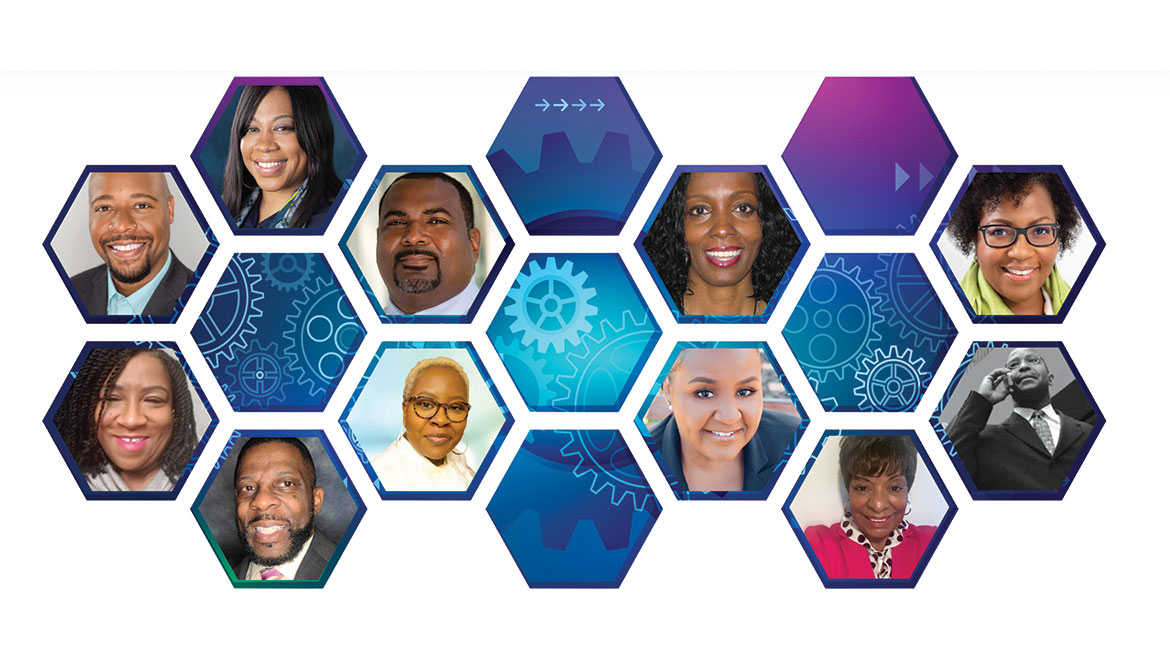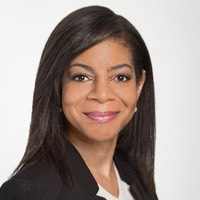9 minutes
CUES supports PSCU in filling its pipeline with diverse talent to move the CUSO—and the industry—forward.
According to a recent report, one in five Black professionals feels that someone of their race or ethnicity would never achieve a top job at their company, despite often being more ambitious than their white counterparts. The report by Coqual (formerly the Center for Talent Innovation), a workplace think tank in New York, also cites the lack of access to senior leadership and opportunities to forge relationships with key decision-makers as a reason that Black employees struggle to advance in their organizations.
To ensure Black and African American professionals are given opportunities to advance in the credit union industry, CUES recently created a customized, year-long leadership development program for CUESolutions provider PSCU, St. Petersburg, Florida. Launched in January 2021, PSCU Bold Effective Leaders: A CUES Strategic Leadership Development Program provided intensive leadership development designed to build PSCU’s leadership pipeline by preparing participants for senior leadership positions. The program also reinforced PSCU’s already strong foundation for its ongoing diversity, equity and inclusion efforts.
Developed and facilitated by CUES Consulting, the year-long program featured live online sessions led by prominent business school faculty and industry leaders, independent study modules, and virtual courses from CUES offered in partnership with Cornell and Harvard. CUES Consulting facilitators supported participants’ progress through the program and internal discussions at PSCU to create a learning experience customized to be as effective as possible.
“The collaboration was to provide our Black and African American leaders a chance to enhance their skills, their expertise, and really get them ready for roles that will position them to move our company and our industry forward,” says Chuck Fagan, president/CEO of PSCU and a CUES member.
“The ultimate goal is to pave the way for future DEI initiatives,” Fagan says. He adds that PSCU’s investment in the Commitment to Change initiative with the African-American Credit Union Coalition also supports this vision.
“There have just been a number of things that pulled it together—certainly my relationship with and passion for CUES, my relationship with John Pembroke (president/CEO of CUES) in particular, and just the two teams collaborating,” he says. “We wanted to be a leader in the space, and I know CUES is already a leader in the space. We will continue to invest in our people. We will grow our leadership team and move them through all the different levels of leadership. This program is a great example of that.”
The CUES-PSCU collaboration was suggested by CUES member Marvin York, PSCU’s VP/contact center member engagement, who was struck with the idea when looking at offerings on the CUES website. “Once I started reviewing the prestigious CUES programs online, I thought this would be a great opportunity to develop programs specifically for our African American professionals who are career-focused,” says York. “Education is key, and this was a way to provide access to the materials needed to be successful.”
York adds that it was the interaction with others in Sankofa, PSCU’s African American business resource group (at pscu.com/diversity-equity-inclusion, see the Sankofa tab under “PSCU Business Resource Groups”), that exposed the need for more in-depth support for those interested in advancing their careers. After York founded the group, one of its first actions was to send a group of key leaders to PSCU’s different campuses to share their journey on how they advanced into leadership roles.
“Sankofa helped shape the business model for developing mentees and mentors,” says York. “In order to close the opportunity gap for employees of color, PSCU needed to provide greater access to leadership education. This new development program prepares African American leaders for advanced roles so that when next-level positions become available, they are ready to take on those roles.”
Jen Scheib, professional development coordinator for CUES, says that when York reached out to her to explore partnering to create a custom leadership development program for this select group of high-performing PSCU employees, the goal he expressed was “to help these individuals with their own professional growth and development while also supporting and enhancing the DEI initiatives” at PSCU. “We were grateful to be approached by Marvin and PSCU and to be a part of that for them,” she says.
Program participant Sheila Porter says that in her 30-plus years in the credit union industry, she’s never had such a great leadership development opportunity. “You have the individual courses that your company offers—their leadership courses—but nothing as in-depth as this,” says Porter, VP/enterprise program management at PSCU and a CUES member. “The speakers, opportunities and breakdown of the classes were just phenomenal.”
The program included 12 leaders and 12 executive mentors/coaches. York and Porter were both program participants and mentors/coaches. This allowed them to experience the program from both perspectives, ensuring that it was in alignment with York’s initial goals.
Elements of Success
So what made this program so successful?
PSCU participants cited the high level of engagement with their CUES representative, Jen Scheib, as well as the discussions and engagement with the PSCU executive suite.
CUES member Mike Dove found the regular check-ins with Scheib to be very effective. VP/center process excellence at PSCU, Dove says he appreciated her reminding participants what they had already done and what they would do next. “I’m a checklist guy, so that was wonderful for me and a huge tieback to the class,” he says.
Scheib is humbled by the praise and found the experience as the CUES program facilitator to be phenomenal. “They were really engaged and just had so much drive and initiative from the beginning and throughout,” she says.
“Unexpectedly,” she adds, “what came out of that was just how inspiring it was for me to be part of it. We had so many wonderful conversations, both in the large group and individually with the participants, that really affected me in a positive way. They helped me learn a great deal also.”
Porter says that in addition to the speakers, support from members of the executive suite and SVPs at PSCU and facilitation from CUES, the support of other participants was probably the most important driver of the program’s success.
“The cohort’s commitment to helping one another succeed—from having one member schedule all the courses on our calendars for visibility to meeting with our accountability partner to discuss the coursework and apply the knowledge”—was critical, she says. “And all of this worked in a remote environment which allowed participation from our various sites.”
Dove expresses a similar sentiment. “I think building the cohort relationship in the beginning was very important,” he says. “You’re going in together, and you’re leaving together.”
Top Takeaways
Dove and Porter identify top program takeaways.
“I was impressed with what CUES put together,” says Dove. “I wasn’t aware of the opportunities for this type of training and development.” One of the highlights for him was learning how to align his strategic goals and targets with improved communication style and skills, in addition to gaining an understanding of how to influence through communication.
“I was shocked to see that one of the modules was ‘communication and leadership influence,’” Dove adds. “The course itself was exactly what I’ve been trying to figure out. I was really deep into that part of the program—tying it together with strategy, some of the nonoperational practical skills and also learning about heuristics (quick problem-solving) and human behavior.” He adds that it stressed to him that the human skill of influential communication is just as important as job-specific knowledge.
Porter says a top takeaway for her was learning about the career journeys of senior leaders at PSCU and what inspired them. “It really has helped me to clarify my own journey and also look at possibilities for others’ journeys,” she says. She also enjoyed Pembroke’s session on diversity and transformation.
“We had a session ... where we just asked him questions about challenges that we were facing as African American leaders and challenges he faced,” Porter details. “He said, ‘In order for something to be new or created, something has to die. And you have to learn how to prepare people for that death.’
“It was a very interesting concept because DEI is new for a lot of folks and uncomfortable for a lot of folks,” she adds. “So, you really have to think about how you transform thinking. ... You have to take people along that path for a full transformation.”
Keeping it Going
The PSCU Bold Effective Leaders program concluded with the implementation of each participant’s final project. The projects and timelines will be assessed to determine how the leaders used the new skills they learned. “Then we make sure that we stay on that track,” says York. He adds that PSCU’s learning and organizational development department will be collaborating with CUES to build additional programs over time.
Scheib wants to ensure that participants’ learning is carried forward.
“For example, we are offering ways they can participate in the CUES community by providing a platform for them to share their experiences and ideas as leaders.” Scheib adds that she is looking forward to seeing the impact the participants make at PSCU and in the industry—and that she hopes CUES Consulting can adapt this program for implementation with credit unions and other industry groups.
Next Steps
Fagan doesn’t see this program as a one-and-done event either.
“We’re always looking for what that next development avenue is going to be for our employees,” he says. “The fact that we had high engagement and very positive feedback on the program hopefully generates interest in what that next program will be.
“We’ve really encouraged each individual to own their career direction path and to engage in ongoing development, which when employee-driven and manager-supported all come together,” Fagan adds. “That’s what this program really established.”
York says he would welcome the opportunity to partner with CUES again.
“This was our first effort at building a training curriculum, and I do believe there are others that would like to take the course,” he says. “We will identify the next candidates—those employees for whom the sky is the limit. They are very capable, and our job is to make sure the opportunities are there for them.” cues icon
Formerly a member of the CUES marketing staff, Felicia Hudson Hannafan is a writer based in Chicago.






